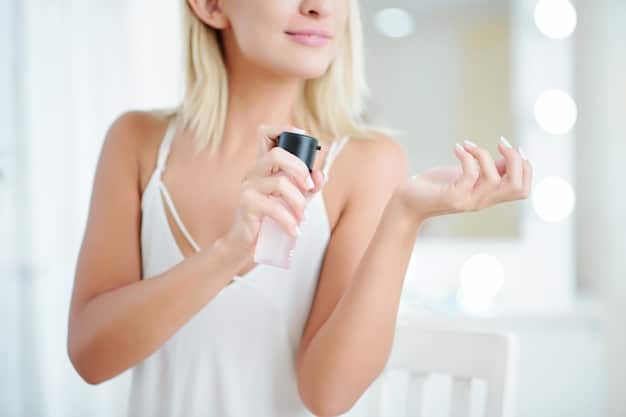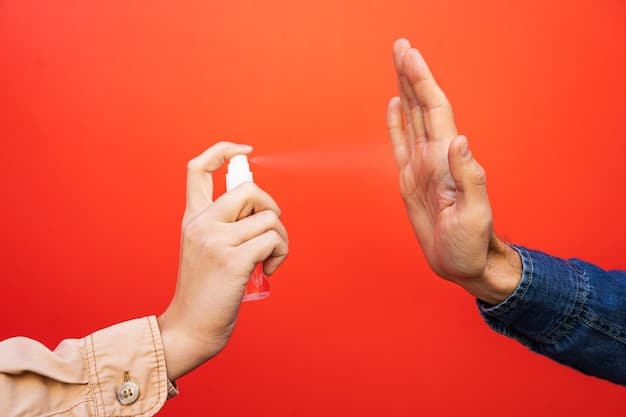Unveiling the Impact of Skin Chemistry on Fragrance in the US

The impact of skin chemistry on fragrance is a complex interplay of factors including pH levels, hydration, oil production, and individual microbiome composition, all of which can significantly alter how a scent develops and lasts on different individuals in the US.
Ever wondered why your favorite perfume smells amazing on your friend but falls flat on you? The secret lies in the intricate relationship between your skin and the fragrance. Let’s explore the impact of skin chemistry on fragrance: understanding how your body affects scent in the US.
Understanding Skin Chemistry: The Foundation of Fragrance Interaction
Skin chemistry isn’t just a buzzword; it’s a real phenomenon that significantly influences how a fragrance smells and performs. Factors like skin pH, hydration levels, and oil production play critical roles. Let’s understand how the nuances of our individual skin affect the scents we wear.
The Role of Skin pH
Skin pH, a measure of its acidity, typically ranges from 4.5 to 5.5. This inherent acidity affects how fragrance molecules break down and evaporate. Those with more acidic skin may find that certain notes, especially sweeter ones, are amplified.
Hydration Levels
Well-hydrated skin tends to hold onto fragrance longer than dry skin. Think of your skin as a sponge: a moist sponge will retain liquid better than a dry one. Applying a moisturizer before your perfume can significantly extend its longevity.

Consider these factors:
- pH Imbalance: Affects the breakdown of fragrances, altering their scent profile.
- Dry Skin: Leads to faster evaporation and a weaker fragrance presence.
- Oily Skin: Can intensify certain notes, potentially making the fragrance smell different than intended.
Ultimately, the key is understanding your skin’s unique characteristics and how they interact with different fragrance families, helping you make informed choices and ensuring that your chosen scent complements your natural aroma.
The Impact of Skin Type on Fragrance Longevity
Different skin types—oily, dry, or balanced—dramatically influence how long a fragrance lasts. Understanding your skin type can help you select fragrances that harmonize with your body chemistry.
Fragrances and Oily Skin
Oily skin naturally retains fragrance longer because the oils bind to the scent molecules, slowing down evaporation. However, oily skin can also intensify certain notes, so it’s essential to choose carefully.
Fragrances and Dry Skin
Dry skin, conversely, struggles to hold onto fragrance. The lack of moisture means scents evaporate quickly, requiring more frequent reapplication. Using a fragrance-free moisturizer before applying perfume can act as a base, helping to prolong the scent.

Consider these points to maximize scent longevity:
- Hydration: Keeping skin well-moisturized prolongs fragrance duration.
- Layering: Using scented lotions or oils from the same fragrance family can boost longevity.
- Application Points: Apply perfume to pulse points, such as wrists and neck, for better projection and scent retention.
Understanding the nuances of your skin type empowers you to select and apply fragrances that will not only smell amazing but also last throughout the day.
The Role of Diet and Medications
Believe it or not, what you eat and any medications you take significantly impact your body odor and, consequently, how a fragrance smells on you. Consider how these internal factors can change your scent profile.
The Influence of Diet
Certain foods, like garlic, onions, and spicy dishes, can alter your natural scent. These odors are released through sweat, mingling with your fragrance and potentially changing its character.
The Impact of Medications
Medications, including antibiotics and antidepressants, can influence hormone levels and body chemistry. These changes can affect your skin’s pH and oil production, altering how a fragrance smells and lasts.
To mitigate these effects:
- Stay Hydrated: Drinking plenty of water helps flush out odor-causing compounds.
- Balanced Diet: Opt for a diet rich in fruits, vegetables, and lean proteins.
- Consult a Professional: If you notice a significant change in your body odor due to medication, discuss it with your doctor.
Being mindful of your diet and medication can help maintain a consistent base for your fragrance, ensuring a more predictable and enjoyable scent experience.
Hormonal Changes and Fragrance Perception
Hormonal fluctuations due to menstruation, pregnancy, or menopause can greatly alter both your body odor and your sense of smell. These shifts can affect how you perceive fragrances, making your favorite scent suddenly unappealing.
Menstruation and Fragrance
During menstruation, changing hormone levels can heighten sensitivity to certain smells. Fragrances that you typically love might become overwhelming or even unpleasant during this time.
Pregnancy and Fragrance
Pregnancy often brings about significant changes in scent perception. Many pregnant women experience heightened sensitivity to odors, leading to morning sickness and an aversion to fragrances they once enjoyed.
To navigate these hormonal shifts:
- Opt for Lighter Scents: Choose lighter, fresher fragrances during periods of hormonal change.
- Consider Natural Options: Explore essential oils or natural perfumes that are less likely to cause irritation.
- Test Before Committing: Always sample a fragrance before purchasing, especially if you are experiencing hormonal changes.
Understanding the impact of hormonal changes on fragrance perception will empower you to make mindful scent choices that complement your current state, ensuring a pleasant and comfortable olfactory experience.
The Role of Your Unique Microbiome
Your skin microbiome, the community of microorganisms residing on your skin, plays a significant role in how a fragrance interacts with your body. Each person’s microbiome is unique, influencing scent development.
Understanding the Microbiome
The microbiome breaks down and transforms fragrance molecules, leading to subtle yet noticeable variations in scent. These interactions are influenced by factors like hygiene habits, environment, and genetics.
Maintaining a Healthy Microbiome
Factors like harsh soaps and over-exfoliation can disrupt this delicate balance, affecting how fragrance smells. Focus on preserving and nurturing your skin’s natural defenses.
Enhance your fragrance experience by:
- Gentle Cleansing: Use mild, fragrance-free cleansers to maintain microbiome balance.
- Avoid Harsh Chemicals: Steer clear of products with harsh chemicals that can strip the skin of its natural oils.
- Probiotic Skincare: Consider incorporating probiotic skincare products to promote a healthy microbiome.
Embracing a skin-friendly approach to fragrance, one that respects and nurtures your skin’s delicate ecosystem, ensures a harmonious and personalized scent experience.
External Environmental Factors and Fragrance
Environmental conditions like temperature, humidity, and air pollution profoundly influence how fragrances manifest and persist on your skin. These external elements alter scent characteristics.
Temperature’s Influence
High temperatures accelerate fragrance evaporation, causing scents to project more intensely but fade quicker. In warmer climates, consider lighter, fresher fragrances that won’t become overpowering. In cooler climates, richer, warmer scents tend to perform better and last longer.
Humidity’s Impact
High humidity can intensify certain notes, particularly sweet and heavy ones. This can make fragrances smell cloying or overwhelming. Lower humidity can cause fragrances to evaporate more quickly, diminishing their impact.
Consider these variables:
- Climate Considerations: Adapt your fragrance choices to suit the climate.
- Seasonal Rotation: Adjust your fragrance wardrobe seasonally to align with changing weather conditions.
- Air Quality Awareness: Be mindful of air pollution, which can interfere with fragrance molecules and alter scent profiles.
By aligning your fragrance choices with the environmental context, you can optimize the impact of your scent and ensure a balanced olfactory experience, no matter the external conditions.
| Key Point | Brief Description |
|---|---|
| 🧪 Skin pH | Affects how fragrance molecules break down, altering the scent profile. |
| 💧 Hydration | Well-hydrated skin retains fragrance longer, extending its longevity. |
| 🍔 Diet | Certain foods can alter your natural scent, influencing fragrance. |
| 🌡️ Environment | Temperature and humidity affect fragrance evaporation and intensity. |
Frequently Asked Questions
▼
Skin chemistry varies from person to person, influencing scent development. Factors like pH, hydration, and microbiome interact with fragrance molecules, leading to personalized scent profiles.
▼
Ensure your skin is well-hydrated by applying a moisturizer before the perfume. Layering scents with lotions or oils from the same fragrance family can also boost longevity.
▼
Yes, medications can influence hormone levels and body chemistry, altering how a fragrance smells and lasts. Discuss any concerns with your doctor if you notice changes.
▼
Certain foods, like garlic and spices, can be secreted through sweat, mingling with your fragrance. Maintaining a balanced diet can help maintain a consistent base for your scent.
▼
Temperature and humidity significantly impact fragrance. High heat accelerates evaporation while humidity can intensify certain notes. Adjust your fragrance choices to suit the climate for optimal impact.
Conclusion
Understanding the impact of skin chemistry on fragrance allows for a more personalized and satisfying scent experience. By being mindful of factors like skin type, diet, hormonal changes, and environmental conditions, you can make informed choices that ensure your fragrance complements your unique self.





